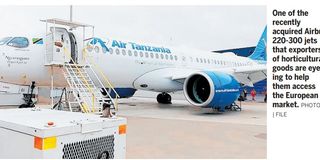Move to use ATCL for horticulture exports

What you need to know:
High landing fees and low business have discouraged major dedicated cargo planes from overseas from extending their services to Tanzania
Arusha.
“Using ATCL will, in fact, cut down on the high cost of transporting our produce to the markets overseas,” said one of the local exporters.
Mussa Mvungi, the managing director of the Arusha-based HomeVeg Limited said first contact with the ATCL top brass over the issue offered some hopes.
He called on horticultural exporters to take advantage of the development because the first international destination for ATCL will be London in the UK.
He said air freight rates offered by the Royal Dutch Airline, KLM, for its direct flights to Amsterdam were high, apparently due to its monopoly on the route.
Most of the horticulture from Tanzania destined overseas ends up in the Amsterdam hub from where it is freighted to consumers.
KLM charges $1.6 per kilogram for air freighting horticultural produce from Tanzania to Amsterdam compared to $1.25 per kilogram on the Nairobi-Amsterdam route.
“KLM rates are not friendly. With $1.6 per kilo our products cannot be competitive in the market,” he told The Citizen in an interview.
The Dutch airline operates several daily flights between Amsterdam and Kilimanjaro and Julius Nyerere International airports but has no dedicated cargo service to Tanzania and instead uses passenger planes to carry horticulture produce.
Mr Mvungi added that he recently communicated directly with ATCL managing director Ladislaus Matindi over the issue.
“Unfortunately he was overseas (in Canada), but promised the national carrier would see what it can do on the request,” he said.
ATCL, which has received a total of six planes in the last few months, is yet to begin its much hyped intercontinental flights to Asia and Europe.
Mr Mvungi said reaching out to ATCL was one of the strategies used by industry players in horticulture to lobby for increased support from the government.
“These include cutting down the landing fees to our airports for flight companies to reduce costs,” he pointed out.
Horticultural exporters and other stakeholders, he said, want ATCL to ensure their planned destinations to Europe to focus on major horticulture product markets such as the UK, France, Germany and the Netherlands.
“This will bring competition to the current freighters and thus exporters benefit by getting better rates,” he explained.
Major horticultural crops grown in Tanzania include tomatoes, cabbages, onions, carrots, round potatoes, pineapples, mangoes, oranges, flowers, seeds and spices.
By 2016, it was estimated that about one million tonnes were produced per year with those air-freighted overseas routed through Nairobi.



